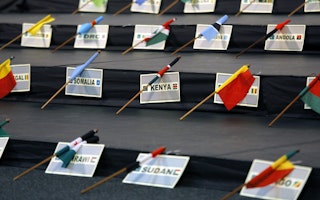Development Decoded
By Fawzia Naqvi
What is the best way to help Africa’s population benefit from the wealth generated by the continent’s natural resources? In his new book Economic Development: What Everyone Needs to Know, Marcelo Giugale, World Bank director of economic policy and poverty reduction programs for Africa, explores this and other questions. I asked him to tell me more.
Tell me about your book.
This book brings you right into the trenches of economic development, so you can see for yourself what practitioners are doing—and get a sense of the issues, dilemmas, options, frustrations and opportunities they actually face, day in and day out. In jargon-free, kitchen-table language, you are shown the frontier of the development practice, the point at which knowledge stops and ignorance begins. There is no math, graphs, or models—much less theories.
Instead, this book engages you in a question-and-answer conversation on what matters to make societies prosper. From how difficult it is to get governments to function, to the basic policies that economies need to work well, to the promising new tools for social assistance, to the challenges of inclusion, education, health, infrastructure, technology, data, foreign aid—you name it.
In the end, all of this is seen through the lens of the region that represents development, and the need for it, better than any other: Africa.
Why did you write this book?
You hear a lot about global poverty, billions of people living with almost nothing. You feel terrible about it and wonder why governments, development banks, think-tanks, academics, NGOs and many others don’t just fix the problem. Well, this book is an invitation to see for yourself what all those actors are actually doing.
By the time you are finished reading you should feel informed enough to form your own opinions and empowered enough to join the debate. This book is about what works, what doesn't work, and what looks promising, not just in Africa but wherever poverty exists.
What is the single most important line in your book?
"Economic development, and the poverty reduction that goes with it, have never been more possible for more countries." This sentence summarizes the impact of a major shift in the conceptual and practical, tectonic plates on which economic development is based.
How governments are held accountable, how social assistance is tailored to the individual, how economic policy reached a new consensus, how science penetrates sectors, or how foreign aid is delivered, have all changed over the past decade, and will continue to change, mostly for the better. Not in a straight line, not without risks, and not everywhere but, on the whole, unprecedented progress is being made, and will go on.
Along with the Soros Economic Development Fund, the World Bank works to fight poverty in Africa.
Until December 2016, Fawzia Naqvi was a vice president of the Soros Economic Development Fund.


